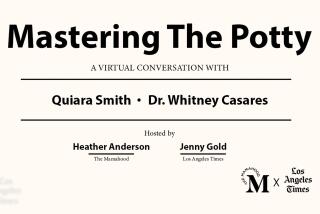Habits that feed child obesity are widespread, study finds
At the tender age of 2 months old, many American babies appear to be taking their first steps on the road to obesity, helped along by parents who may be preoccupied, pushy or uninformed about the care and feeding of babies for optimal health, a new study says.
The latest research found that in a population of predominantly low-income mothers and infants, 2-month-old babies routinely spent long hours either in front of a television or being fed or cared for by a parent watching TV, were frequently put to bed or left to feed themselves with a propped bottle, and rarely got the recommended amount of daily “tummy time” that challenges a baby’s physical development.
Those are just a few of the parenting practices that have been linked by large population studies to a child’s later risk of becoming obese. Others include early introduction of solids (most often by putting cereal in a baby’s bottle), giving a baby sweetened drinks such as fruit juices, and encouraging a baby to keep feeding after she no longer shows interest in continuing.
The study, published Monday in the journal Pediatrics, found that, when it comes to care and feeding practices thought to raise a baby’s obesity risk, differing ethnic and racial patterns emerged.
Latino caregivers were more likely than white parents and black parents to encourage a baby to finish a bottle or breast-feeding even after it lost interest. And nearly 4 in 5 Latino moms (virtually all the caregivers were female) did not put a baby down for more than a half-hour a day of “tummy time.”
But nearly half of Latino mothers breast-fed their babies for at least half of their feedings at 2 months of age -- more than white (40%) or black mothers (23%). And the practice of adding cereal to a bottle (generally done to induce a feeling of fullness in the baby) was most rare among Latino caregivers, and fully 63% said they rarely or never watched TV while feeding their baby.
Among the study’s white parents, roughly 60% said they watched TV more than half the time they fed their baby (compared to 73% of African American caregivers). But white and black moms were roughly equally likely to give their baby the prescribed amount of “tummy time” -- between 45% and 46% of such parents let their baby scramble around on her belly for a half hour or more per day.
African Americans in the study were most likely to fortify their babies’ bottles with cereal at 2 months (23.5% did so, compared to 15.9% of whites and 3.8% of Latinos). They were least likely to be breast-feeding at 2 months (33% still did at least sometimes) and they were most likely to prop a baby’s bottle for more than half of the baby’s feedings (compared to 10% of whites and 4% of Latinos).
The new research “adds further texture” to what experts know about feeding patterns and ethnicity, said the authors, who followed caregivers and their babies at sites in North Carolina, New York, Tennessee and Florida. That, they added, should help researchers and clinicians devise culture-specific interventions that may reduce the practices that predispose babies to grow into obesity.







